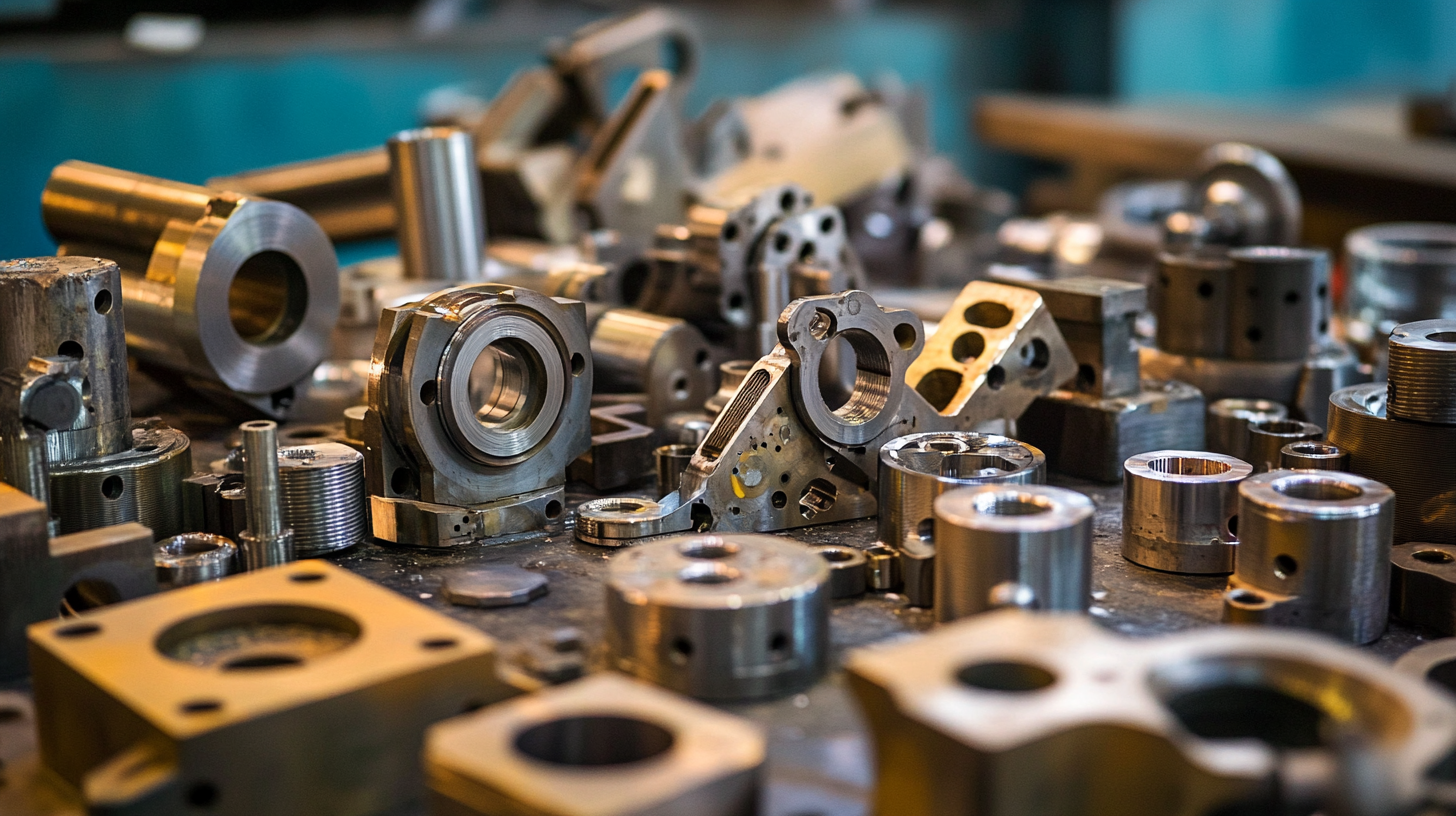Evaluating CNC Parts: Key Factors That Distinguish Quality Suppliers
As the demand for precision engineering continues to surge, the importance of high-quality CNC parts has never been greater. According to a recent study by the International Federation of Robotics, the global market for CNC machining is projected to grow by 7.7% annually, driven by advancements in automation and an increase in customized manufacturing needs. This growth signals not only a rising reliance on CNC technology but also the necessity for industry leaders to refine their supplier evaluations, ensuring they partner with companies that provide exceptional CNC parts.
Quality CNC parts are pivotal in sustaining competitiveness and operational efficiency across various sectors, including aerospace, automotive, and electronics. The American Society of Mechanical Engineers (ASME) highlights that over 70% of manufacturing defects can be traced back to poor component quality, underscoring the critical nature of supplier selection. This blog aims to explore the key factors that distinguish quality suppliers of CNC parts, offering insights that can help businesses enhance their manufacturing processes and reduce costs associated with subpar components.

Understanding CNC Machining Standards for Quality Parts
CNC machining has revolutionized the manufacturing industry by enabling the production of precision components with unparalleled efficiency. To ensure that the CNC parts meet the desired quality standards, it’s crucial to understand the machining standards that govern this process. These standards not only define the dimensional accuracy and material specifications but also set guidelines for performance and reliability. Familiarizing yourself with these benchmarks is essential for identifying suppliers that can consistently deliver high-quality components. One of the key aspects of CNC machining standards is tolerance levels, which outline the acceptable deviation in dimensions for each part. These tolerances are critical as they determine how well a part will fit with others in an assembly, affecting overall functionality. In addition, material specifications detail the types and grades of materials that should be used, accounting for factors like strength, durability, and corrosion resistance. A quality supplier will adhere to these specifications, ensuring that the parts produced will perform as required under real-world conditions. Moreover, compliance with industry standards such as ISO 9001 can further assure quality. This certification demonstrates that a supplier has implemented a robust quality management system, focusing on continuous improvement and customer satisfaction. When evaluating suppliers, look for those who not only have the necessary certifications but also a proven track record in meeting compliance requirements. By placing emphasis on these CNC machining standards, businesses can partner with reliable suppliers, resulting in enhanced product performance and reduced operational risks.

Identifying Essential Quality Control Practices in CNC Manufacturing
In the world of CNC manufacturing, quality control practices are paramount for ensuring product excellence. Effective quality control starts long before the machining process; it involves a thorough understanding of material selection and meticulous planning. Suppliers who invest time in sourcing high-quality materials are more likely to produce durable and precise parts. From the very first inspection of raw materials to the final quality checks of finished products, a rigorous approach is essential.
Another essential practice is the implementation of in-process inspections. This means conducting regular checks during various stages of production to identify defects early. Quality suppliers often utilize advanced technologies such as automated measurement systems and real-time monitoring of machining parameters. This proactive approach not only prevents costly rework but also assures customers that their products meet stringent specifications.
Furthermore, documentation and traceability play a crucial role in quality control. Suppliers must maintain detailed records of processes, measurements, and quality checks to provide transparency and accountability. This not only facilitates problem-solving in case of defects but also builds trust with clients, as they can be assured of consistent quality across orders. A supplier’s commitment to ongoing training and adherence to industry standards further distinguishes them in a competitive landscape, demonstrating their dedication to quality craftsmanship and customer satisfaction.

Assessing Material Selection and Its Impact on Part Durability
When assessing CNC parts, material selection plays a crucial role in determining the durability and overall performance of the final product. Different materials exhibit distinct properties that can significantly impact how parts perform under specific conditions. For instance, metals such as aluminum and steel are widely used in CNC machining because of their strength and resilience. However, variations in alloy composition and treatment processes can lead to differences in durability that potential buyers must consider.
In addition to metals, advanced materials like carbon composites and plastics have gained popularity for their lightweight and corrosion-resistant properties. These materials can offer unique advantages in applications where weight reduction is critical, such as aerospace and automotive sectors. Understanding the intended application of a CNC part will guide manufacturers in selecting materials that not only meet performance standards but also provide longevity and cost-effectiveness in the long run.
Moreover, the impact of material selection extends to the machining process itself. Certain materials may require specialized tools and techniques, influencing the overall production timeline and cost. Suppliers that clearly communicate their material capabilities and provide guidance on material selection are often distinguished by their commitment to quality. Thus, evaluating a supplier's material offerings and their expertise in machining specific materials is essential for securing parts that can withstand the demands of the intended application.

Evaluating Supplier Certifications and Their Importance in CNC Production
In the competitive landscape of CNC production, supplier certifications play a critical role in distinguishing quality suppliers from the rest. Certifications such as ISO 9001, AS9100, and ISO 14001 not only reflect a supplier’s commitment to quality management and environmental responsibility but also serve as a benchmark for assessing their operational efficiency. According to a report by the International Organization for Standardization, organizations that implement ISO standards report a 20% increase in operational efficiency and a 30% improvement in customer satisfaction ratings, highlighting the tangible benefits of working with certified suppliers.
Moreover, the emphasis on Environmental, Social, and Governance (ESG) criteria in supply chain evaluation cannot be overlooked. A recent study indicates that companies prioritizing ESG standards see a 15-20% reduction in supply chain risks, which directly influences their sustainability performance. This is vital in CNC production, where the impact of manufacturing processes on the environment is under scrutiny. Suppliers that demonstrate adherence to ESG principles not only enhance their reputation but also contribute to the overall sustainability goals of their clients, aligning with the growing consumer demand for responsible sourcing.
In summary, the significance of evaluating supplier certifications extends beyond compliance; it represents a strategic approach to ensuring quality, efficiency, and sustainability in CNC parts manufacturing. By focusing on certified suppliers who excel in ESG performance, companies can secure a reliable supply chain that meets not only performance standards but also ethical expectations.
Analyzing Customer Support and Communication as Quality Indicators
Customer support and communication are fundamental indicators of a quality supplier, especially in the CNC machining industry. A recent report from Industry Week highlights that companies with strong customer service capabilities enjoy 8-10% higher customer retention rates than those lacking in this area. This statistic emphasizes the critical role that effective communication plays in building relationships and trust between suppliers and clients.
When evaluating CNC parts suppliers, it's essential to consider how they handle inquiries and issues. According to a survey conducted by the International Journal of Advanced Manufacturing Technology, 85% of buyers ranked responsiveness to customer inquiries as one of the top three factors influencing their purchase decisions. A supplier’s ability to provide timely and clear communication can significantly enhance the overall customer experience, ultimately leading to long-term partnerships.
Moreover, the importance of proactive communication cannot be overlooked. Suppliers that regularly update clients about order status, potential delays, or changes in production processes not only mitigate misunderstandings but also position themselves as transparent and reliable partners. This proactive approach is backed by findings from a Deloitte report, which states that organizations that prioritize communication tend to see an increase in customer satisfaction by up to 20%. Therefore, when selecting a CNC parts supplier, assessing their customer support and communication strategies should be a top priority, as these elements are crucial in distinguishing quality providers from the rest.
